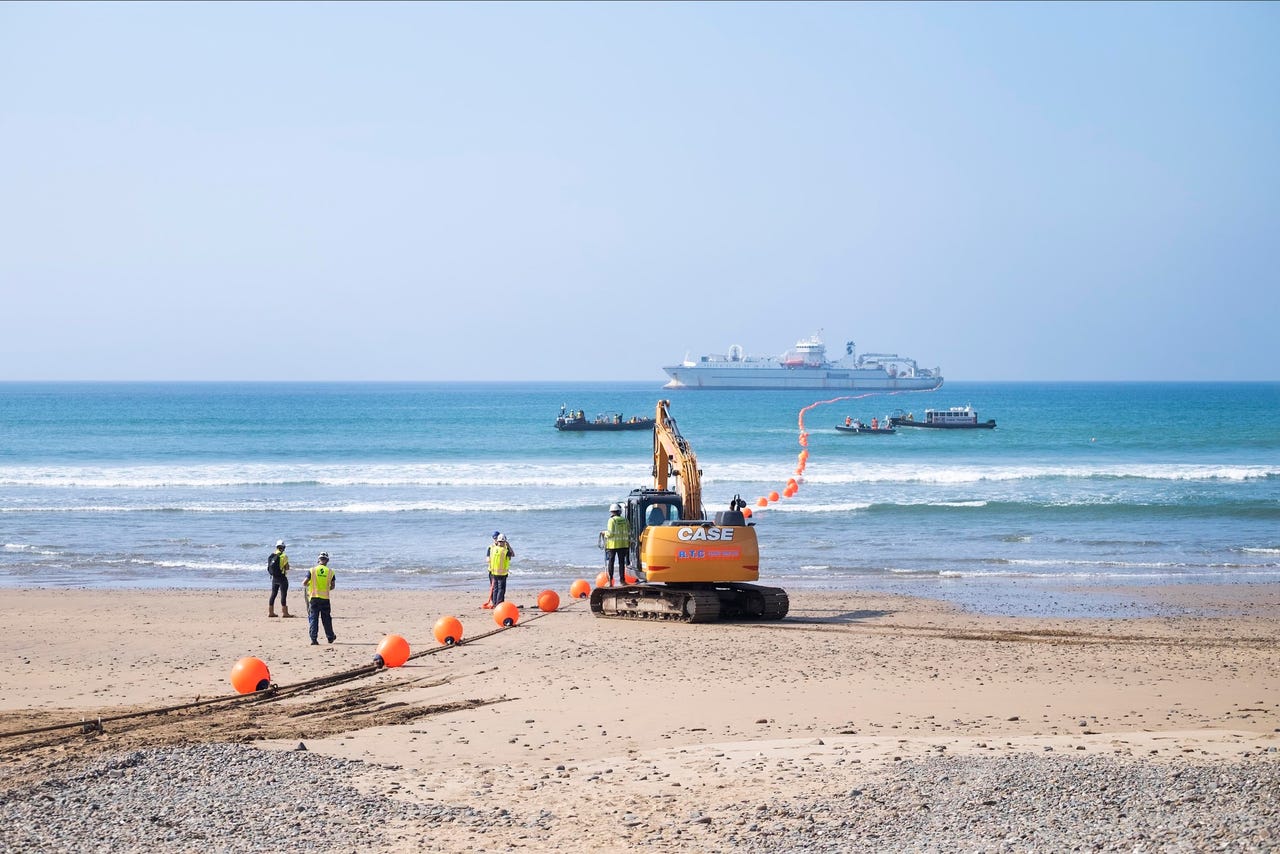
































Dubbed Grace Hopper, the subsea cable uses new optical fiber switching to boost capacity.
Image: GoogleGoogle has completed the UK leg of its private trans-Atlantic subsea cable connecting the US, the UK and Spain, offering it more secure connections than what's available on the public internet.
Dubbed Grace Hopper after the computer science pioneer who among many other things helped design the COBOL programming language, the subsea cable uses new optical fiber switching to boost capacity.
Which video conferencing platform is right for your business? We've gathered details about 10 leading services.
Read nowGoogle funded the subsea 16-fibre pair cable that connects New York to Bude, Cornwall, about 250 miles south of London, and Bilbao on Spain's Atlantic north coast. It will also support Google's new cloud region in Madrid.
SEE: Is remote working good or bad? Big tech companies just can't seem to decide
The Grace Hopper cable is a milestone for Google as it's the company's first self-funded cable to the UK and similarly was the first self-funded cable to Spain. It's also one of the first new cables to connect the US and the UK since 2003.
Google says it signals its ongoing investments in the UK to support users of its core products, such as Google Maps, Search, Gmail, various Workspace apps, and Meet, as well as UK tech firms that use Google Cloud Platform.
"Improving the diversity and resilience of Google's network is crucial to our ability to continue supporting one of the UK's most vital sectors, as well as its long-term economic success," says Jayne Stowell, a strategic negotiator for Google Cloud's global infrastructure.
The other selling point of the subsea cable is that it supports video meetings and other online services that became essential to replacing in-person meetings during the pandemic.
"With the ongoing pandemic fostering a new digital normal, Google-funded subsea cables allow us to plan and prepare for the future capacity needs of our customers, no matter where they are in the world. Grace Hopper will connect the UK to help meet the rapidly growing demand for high-bandwidth connectivity and services," says Stowell.
"The multi-directional switching architecture is a significant breakthrough for uncertain times, and will more tightly integrate the upcoming Google Cloud region in Madrid into our global infrastructure," she added.
Google's other subsea cables include Curie, between Chile and Los Angeles; Equiano, between Portugal and South Africa; Dunant, which connects the US and France, along with a Havfrue link in Denmark; the recently announced subsea cable called Apricot, connecting Singapore, Japan, Guam, the Philippines, Taiwan and Indonesia; and the companion Echo subsea cable connecting the US, Singapore, Guam and Indonesia.
Across the world undersea cables are becoming part of the geopolitical calculations of many countries. And the Atlantic Council, a US think tank, this week raised an alarm about threats to subsea internet cable infrastructure.
"The undersea cables that carry Internet traffic around the world are an understudied and often underappreciated element of modern Internet geopolitics, security, and resilience. It is estimated that upwards of 95 percent of intercontinental Internet traffic is carried over these cables," the Atlantic Council warned in a paper urging the Biden Administration to bolster protections for this infrastructure.
SEE: Video meeting overload is real. Here's how you can to stop the stress building up
The council has particular concerns about China's growing influence on private subsea cables through its own internet giants.
"Authoritarian governments, especially in Beijing, are reshaping the Internet's physical layout through companies that control Internet infrastructure, to route data more favorably, to route data more favorably, gain better control of internet chokepoints, and potentially gain espionage advantage," it notes.
"Second, more companies that manage undersea cables are using network management systems to centralize control over active components (such as reconfigurable optical add/drop multiplexers (ROADMs) and robotic patch bays in remote network operations centers), which introduces new levels of operational security risk. Third, the explosive growth of cloud computing has increased the volume and sensitivity of data crossing these cables."
 Tags chauds:
Maison & bureau
réseautage
Tags chauds:
Maison & bureau
réseautage